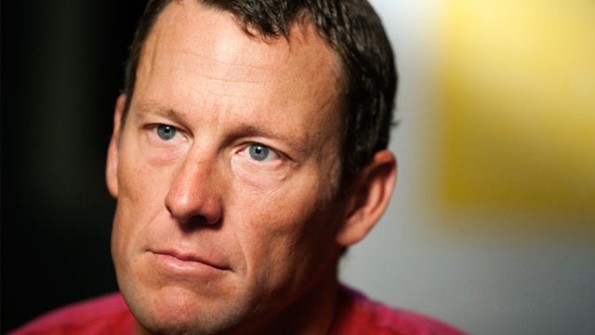What’s disturbing about Lance Armstrong is not just that he used banned drugs to unfairly compete. What’s disturbing is how effortlessly, how compulsively he lied, and how ruthless he became in protecting that lie. And, in a sense, we were all complicit.

“There are these two, completely opposite narratives,” Armstrong tells documentary filmmaker Alex Gibney. “The only person who can start to let people understand what the true narrative is is me.”
The narrative that most of us are familiar with is the athletic comeback story of the last half century. It’s the story of a world class cyclist who, on the verge of his big breakthrough, is diagnosed with testicular cancer that had spread to his lungs, brain and abdomen. After surgery and extensive chemotherapy treatments, Armstrong was declared cancer-free in 1997. He founded the non-profit Livestrong Foundation committed to providing support for cancer patients. A year later, he returned to competitive cycling and won the prestigious Tour de France seven consecutive times.
Throughout all those wins, however, persistent allegations of doping – the use of banned performance-enhancing drugs – continued to follow him. As new evidence began to evolve, Armstrong finally admitted, in a 2013 interview with Oprah Winfrey, that he had cheated and lied to cover it up.
The rise and fall of Lance Armstrong has been the subject of books and articles since he’s come clean. However, two recent documentaries take us inside the story and reveal the lengths the athlete went to in order to suppress anyone who spoke out against him.
In Showtime’s Stop at Nothing: The Lance Armstrong Story, director Alex Holmes takes the traditional route of telling the story mixing sports and news footage along with interviews of the people Armstrong knew; friends and enemies, and in Armstrong’s ruthless zeal to protect his lie, many of those friends soon became enemies.
In one remarkable interview that intercuts between her personal story and a deposition given against Armstrong, one-time close friend Betsy Andreu recounts how Armstrong would brag about the benefits drugs had on his performance and how he kept pushing her cyclist-husband, Frankie, to use drugs himself. She describes the extreme tactics Armstrong would use to intimidate anyone who would dare challenge him. In her case, Armstrong took a personal jet to show up for her deposition just to sit close by.
It’s all very riveting and real.
However, filmmaker Alex Gibney’s 2013 documentary, The Armstrong Lie, takes us to the next level revealing the character, or rather lack of it, with Armstrong himself.
In the film’s trailer, Gibney says he had originally signed-on to follow the comeback of a hero and was granted virtually unlimited access to all areas of Armstrong’s life. (Obviously, that access stopped at the door of the Winnebago where Armstrong was “juicing.”) Gibney says he had completed his film when new allegations of doping surfaced. When the truth finally emerged, Gibney, realizing that Armstrong lied to his face, confronted him and wanted him to personally set the record straight. What is revealed is a man of extraordinary talents, his biggest being a serial liar of biblical proportions.
Why did Lance Armstrong lie for so long?
Looking straight into Gibney’s camera, Armstrong unflinchingly admits, “I like to win. But more than anything, I can’t stand the idea of losing, because to me, that equals death.”
However, Armstrong wasn’t the only one who wanted to win, we wanted him to win. If you can’t participate in world class athletics, the next best thing is watching someone else achieve the impossible. It was all too good to be true. But as Gibney points out, “This is not a story about doping. It’s about power, and the story became about hanging on to that power.”
It was Armstrong’s utter ruthlessness in attacking anyone and everyone who even thought of challenging his story. Former teammate Jonathan Vaughters: “People have to realize that the truth in this is hard. People wanted to believe so bad that they hated anyone who didn’t believe. As a team manager imagine what the reaction would have been if I had said anything.”
In May 2011, another Armstrong teammate Tyler Hamilton told CBS News that he and Armstrong had together taken EPO before and during the 1999, 2000, and 2001 Tours de France. Armstrong’s attorney, Mark Fabiani, claimed that Hamilton was lying. “You see in the footage that Tyler really wanted to tell that story,” says Gibney. “You see in that footage Tyler’s intense discomfort in facing the truth and how hard that was. The code of silence is very real.”
It’s all classic Greek tragedy: the hero overcomes insurmountable odds to attain the Golden Fleece; achieves the respect and admiration of the masses; ascends into a celebrityhood unrivaled by mortal men only to fall into an abyss of his own making.
Yet, even in defeat, Armstrong’s final statements seem calculated, that absolution is somehow, a foregone conclusion.
“People will forgive and forget and move on…,” Armstrong says at the end of Gibney’s film. “I don’t know what people will think in 20, 30, 40, 50 years. Will the record books still be blank? Or will they look at it in the context that it is and say ‘Yeah, he won the Tour de France seven times.’ ”
People will remember the truth, Lance.
Comments









